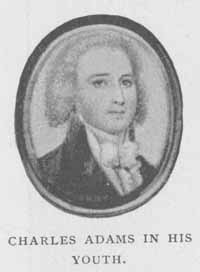Moving into a Harvard Dormitory in 1785
At this time of year young people are settling in at college, including my godson at Cambridge. So I’m looking at the process of entering college in 1785.
Fifteen-year-old Charles Adams started at Harvard College that year. His parents, Abigail and John, were across the Atlantic in London, so he was under the wing of relatives on his mother’s side.
Charles had been studying for the entrance exam with the Rev. John Shaw of Haverhill, an uncle by marriage. On 9 May Charles wrote to his cousin William Cranch: “we study in the bedroom as usual two young fellows from Bradford being added to our number, One of whom will be my chum if we get in and who I should be very glad to introduce to you.”
By “chum,” Charles meant a college roommate. That prospect was Samuel Walker (1768–1846). When Charles’s older brother John Quincy Adams visited that summer, he immediately assured their mother that Samuel was “a youth, whose thirst for knowledge is insatiable.”
Unfortunately, the dormitory wasn’t working out so smoothly. On 14 August, Abigail’s older sister, Mary Cranch, reported to her:
All four Harvard students I’ve mentioned went on to study the law. John Quincy Adams had a long and successful career while his brother Charles did not. William Cranch became a judge in Washington, D.C. Samuel Walker practiced in Rutland, Vermont, for a quarter-century.
Before then, however, Walker was rusticated for a year in 1787 for “stealing from his class mates.” And he seemed like such a studious boy.
Fifteen-year-old Charles Adams started at Harvard College that year. His parents, Abigail and John, were across the Atlantic in London, so he was under the wing of relatives on his mother’s side.
Charles had been studying for the entrance exam with the Rev. John Shaw of Haverhill, an uncle by marriage. On 9 May Charles wrote to his cousin William Cranch: “we study in the bedroom as usual two young fellows from Bradford being added to our number, One of whom will be my chum if we get in and who I should be very glad to introduce to you.”
By “chum,” Charles meant a college roommate. That prospect was Samuel Walker (1768–1846). When Charles’s older brother John Quincy Adams visited that summer, he immediately assured their mother that Samuel was “a youth, whose thirst for knowledge is insatiable.”
Unfortunately, the dormitory wasn’t working out so smoothly. On 14 August, Abigail’s older sister, Mary Cranch, reported to her:
I have just heard that cousin Charles is not like to have the chamber he petition’d for, nor any other. Half his class will be oblig’d to Board out in the Town. Mr. Cranch and I are going tomorrow to see how it is, and to procure him a place if necessary. . . .Fortunately, the situation was soon resolved. On 17 August, Aunt Mary wrote:
You cannot think how sorrowful your son looks about the loss of his chamber, but I hope to make him happy yet. I have got all the Furniture ready, (this is the part he is to find). The Bed and Linnin is found by his chum a very worthy pretty youth, who study’d with him at Mr. Shaws. Walker is his name, he is from Bradford.
Charles is happy he has got his chamber. I return’d last night. I found he had his petition’d granted. He is in the same college with Billy [Cranch,] has a Room upon the lower Floor [of Hollis Hall].Charles Adams’s dorm room thus included a “Bed and Linnin” brought by his chum Samuel, a “looking glass,” a pine table painted like marble, and a “Square Tea Table,” among other things.
I have got him a pine Table made to stand under his looking glass. It doubles over like a card Table and is painted Marble colour and looks very well. He has the Square Tea Table to stand in his study. I got a few things for him in Boston as I came from Cambridge, and now I think he is equip’d and will go tomorrow with the best advice I can give him.
All four Harvard students I’ve mentioned went on to study the law. John Quincy Adams had a long and successful career while his brother Charles did not. William Cranch became a judge in Washington, D.C. Samuel Walker practiced in Rutland, Vermont, for a quarter-century.
Before then, however, Walker was rusticated for a year in 1787 for “stealing from his class mates.” And he seemed like such a studious boy.

